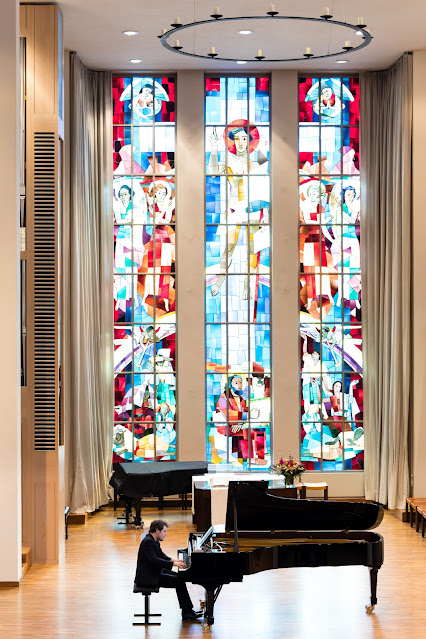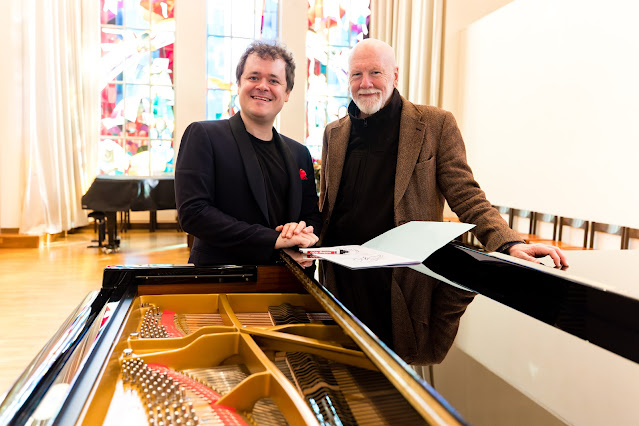 |
| Brett Dean: Faustian Pact - Benjamin Grosvenor - Le Piano Symphonique at Lukaskirche, Lucerne (Photo: Philipp Schmidli für das Luzerner Sinfonieorchester) |
Brett Dean: Faustian Pact, Hommage à Liszt (first performance), Liszt: Sonata in B minor, Chopin: Sonata No. 3; Benjamin Grosvenor; Le Piano Symphonique at Lukaskirche, Lucerne
Reviewed 19 January 2024
Benjamin Grosvenor combines astonishing virtuosity alongside intimacy and sheer power in Liszt's sonata and Brett Dean's new piece inspired by Grosvenor's performance of the Liszt
What did the piano sonata mean for those who came after Beethoven. Chopin' first mature sonata (no 2 in B flat major from 1839) has become one of the icons of the piano repertoire, but for Robert Schumann the work demonstrated that Chopin could not handle sonata form. Chopin wrote his Sonata No. 3, in B minor (a key not used by Beethoven for his sonatas) in 1844, partly to counter these criticisms.
Chopin adhered to the traditional four-movement sonata form but within this he used new, Romantic content to create something new.
Franz Liszt wrote a single sonata in 1853 (also in B minor) and dedicated it to Robert Schumann. But the work had been in progress since at least 1849. Liszt opted for innovation in both structure and content, writing a huge single-movement structure that has commentators talking about its exact meaning.
On Friday 19 January 2024, pianist Benjamin Grosvenor gave the lunchtime recital for Le Piano Symphonique in Lucerne's Lukaskirche. Grosvenor placed Liszt's Sonata in B minor at the centre of his recital, following it by Chopin's Sonata No. 3 and preceding it with the world premiere of Brett Dean's Faustian Pact (Hommage à Liszt), the most recent Dean's homage pieces (previous ones have been included Bach, Beethoven, Brahms and Kurtag), a co-commission from Le Piano Symphonique and Wigmore Hall, and written for Benjamin Grosvenor whose performance of Liszt's sonata inspired Brett Dean's work.
Brett Dean's piece began in a dark and brooding manner, yet certainly virtuoso but moving Lisztian bravura into the 21st century. Despite the flurries of notes, with positive fistfuls at times, a brooding atmosphere persisted along with an almost expressionist melodic outline. After work's first climax everything died down as the music moved to mysterious and perhaps transcendental territory, managing to put astonishing virtuosity alongside inwardness. After a further amazing climax, the work ended in a rather dead-pan manner, leaving the audience rightly astonished, both at Dean's vivid imagination at bringing Liszt into the 21st century and at Benjamin Grosvenor's sheer virtuosity and dynamic projection of emotion.
Benjamin Grosvenor will give the UK premiere of Brett Dean's Faustian Pact (Hommage à Liszt) at Wigmore Hall on 20 April 2024 [further details]
 |
| Benjamin Grosvenor & Brett Dean - Le Piano Symphonique at Lukaskirche, Lucerne (Photo: Philipp Schmidli für das Luzerner Sinfonieorchester) |
With little ado, Grosvenor plunged directly into Liszt's sonata moving in a matter of seconds from barely there, intimate to a strong gesture with tone cutting like a knife. There then followed a full and vibrant exploration of what that opening material implied. Grosvenor's approach was fast and vivid, not shying away from violence and a million miles from Chopin (I heard him in December 2023 in Chopin's Piano Concerto no. 1, see my review). But this power and virtuosity was at the service of the music, and the ongoing forward momentum with which Grosvenor imbued the music continued even in the quieter moments. Here, Grosvenor was tender, but always the questioning anxiety and energy would return.
Grosvenor made the work's virtuosity part of the musical argument and he could turn on a pin, moving from power to intimacy, from tone that sliced like a knife to quiet tenderness. And for all the bravura flourishes, we were clearly on a journey with Grosvenor. When the opening material returned it seemed the same, yet everything was different.
Then suddenly we were in the midst of a tightly controlled fugue. For all the work's dedication to Robert Schumann, Clara never played it in public, finding the work sheer noise. But Grosvenor kept the argument gripping. This was edge of the seat stuff.
You might pause to wonder at Benjamin Grosvenor's speed and virtuosity, but his sheer musical argument kept you going without pause. The end came as a thoughtful resolution. Of sorts.
How to follow that?
 |
| Liszt: Sonata - Benjamin Grosvenor - Le Piano Symphonique at Lukaskirche, Lucerne (Photo: Philipp Schmidli für das Luzerner Sinfonieorchester) |
Transport logistics, alas, meant that we had to slip out before the Chopin, but we felt replete already.
Never miss out on future posts by following us
The blog is free, but I'd be delighted if you were to show your appreciation by buying me a coffee.
Elsewhere on this blog
- Let the dialogue flow: Benjamin Bernheim leads a wonderfully memorable account of Massenet's Werther in Zurich - concert review
- Le Piano Symphonique in Lucerne: From large-scale Liszt and Wagner to intimate Schumann and Schubert - concert review
- An evening of bold & adventurous programming: wind & brass from Southbank Sinfonia & Britten Sinfonia combine - concert review
- Le Piano Symphonique in Lucerne: Made in Switzerland, tenor Daniel Behle & pianist Oliver Schnyder combine musicality & intelligence - concert review
- Le Piano Symphonique in Lucerne: From poetic Liszt and Grieg concertos to a little bit of magic from Martha Argerich and friends - concert review
- Eavesdropping on their dramas: Opera North's 'in the round' production Britten's Albert Herring - opera review
- A shelter where people can be sure of quality and find so much to discover: founder Michael Adda on his record label, La Dolce Volta - interview
- Byrd Compared: Phantasm & Anna Prohaska celebrate the consort song - concert review
- Slowly, through a process of osmosis, the piece and I are slowly becoming acquainted: horn player, Ben Goldscheider on Gavin Higgins' new Horn Concerto - guest posting
- At Kings Place this month, Turkish pianist Can Çakmur celebrates the Hamamatsu Competition which he won in 2018, not to mention embarking on his 12-disc Schubert with BIS - interview
- Home











No comments:
Post a Comment